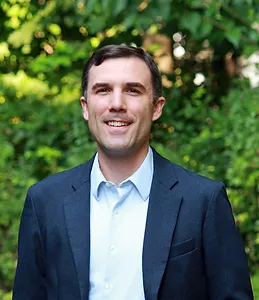 ASHLAND, Ohio – Abraham Edwards, a 2005 graduate of Ashland University and currently a faculty member at Michigan State University, was one of three recipients nationwide of the Mathematical Association of America’s 2023 Henry L. Alder Award for Distinguished Teaching.
ASHLAND, Ohio – Abraham Edwards, a 2005 graduate of Ashland University and currently a faculty member at Michigan State University, was one of three recipients nationwide of the Mathematical Association of America’s 2023 Henry L. Alder Award for Distinguished Teaching.
The prestigious honor goes to “beginning college or university faculty whose teaching has been extraordinarily successful and whose effectiveness in teaching undergraduate mathematics is shown to have influence beyond their classrooms,” according to the MAA website.
Edwards is a professor at MSU’s Lyman Briggs College teaching a variety of math courses, ranging from college algebra, to the calculus sequence, to statistics for scientists, to an honors research seminar in experimental mathematics. He also guides interdisciplinary courses, such as “Proof! A History of Certainty in Mathematics and Science,” “Quest for the Sublime: Mathematics, Poetry, and the Romantic Age” and “Mathematics in Cultural and Historical Contexts.” In addition, he has mentored multiple student research projects, including two that led to publications co-authored with students.
Beyond the classroom, Edwards contributes to the National Science Foundation-funded TRIUMPHS group (Transforming Instruction in Undergraduate Mathematics via Primary Historical Sources) and leads a popular MAA MathFest workshop, titled “Learning from History: Teaching with Primary Source Projects in Your Mathematics Classroom.”
Edwards, who earned a master’s degree in mathematics from Cleveland State University in 2009 and a Ph.D. in mathematics education from MSU in 2016, credits his successful career path, in part, to his days as an undergraduate.
“What really struck me was how much the math faculty (at AU) seemed to enjoy teaching. I think that was what really got me thinking about a career related to mathematics teaching,” he recalled.
Edwards, originally from Grafton, Ohio, also appreciated the personal attention and support that Ashland prides itself on.
“I was able to study mathematics in small classes, taught by expert professors. This created an atmosphere in which learning was enjoyable and I felt supported in my academic journey. I wasn’t the best math student, not by a longshot. But, that’s what’s great about a college like Ashland. The faculty are willing to meet students where they’re at, and it put me on a trajectory to succeed in graduate school and in academia,” he said.










